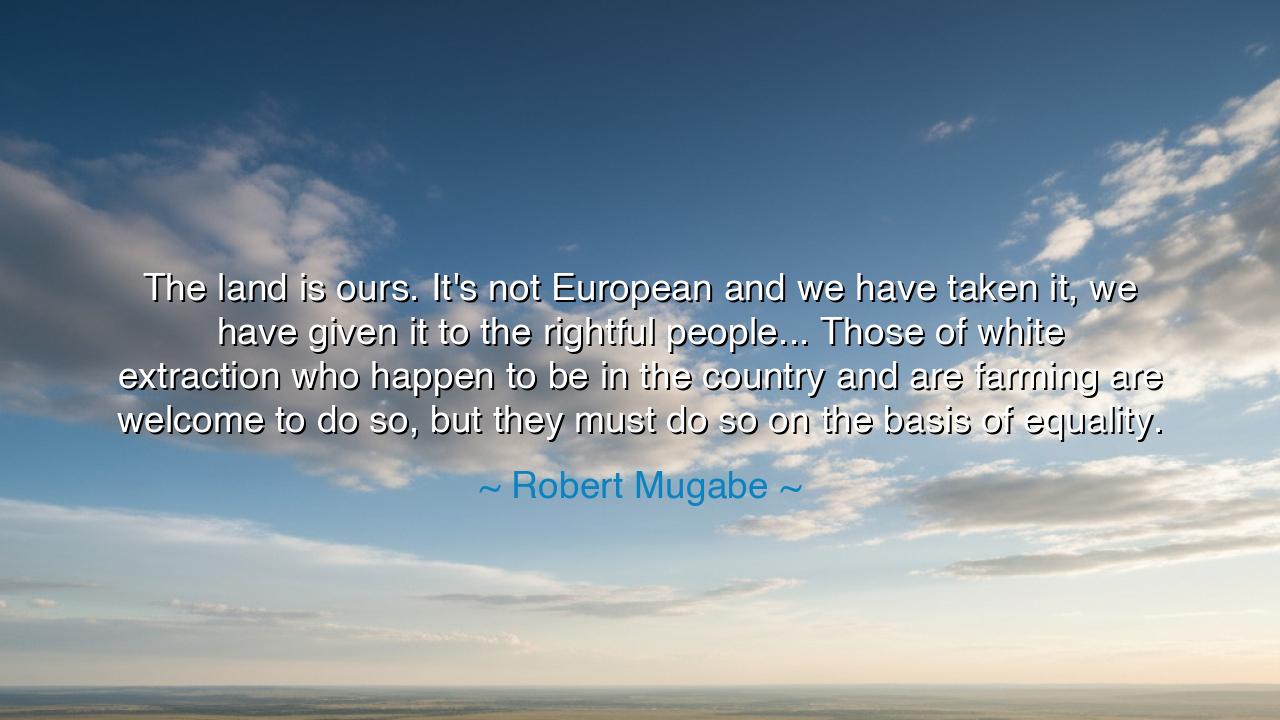
The land is ours. It's not European and we have taken it, we have
The land is ours. It's not European and we have taken it, we have given it to the rightful people... Those of white extraction who happen to be in the country and are farming are welcome to do so, but they must do so on the basis of equality.






“The land is ours. It's not European and we have taken it, we have given it to the rightful people... Those of white extraction who happen to be in the country and are farming are welcome to do so, but they must do so on the basis of equality.” So declared Robert Mugabe, and in these words we hear the roar of history itself, the cry of a people long dispossessed who sought to reclaim what was theirs. It is a statement both defiant and triumphant, born from the deep wound of colonial rule, when lands were seized, peoples displaced, and generations left to labor as strangers upon their own soil. His words ring with the fierce spirit of reclamation: that the earth beneath one’s feet belongs first to those whose ancestors bled upon it.
The land has ever been more than soil; it is identity, inheritance, and survival. In Africa, as in all lands, it is the mother that feeds her children. To be stripped of it, as colonial conquest did, was to be robbed not only of wealth but of dignity. Mugabe’s declaration speaks to this truth: the land was not European, for it was tilled by African hands long before ships came from across the seas. To take it back was not theft but restoration. In his words we hear echoes of other ages, when the oppressed rose to reclaim what invaders had seized.
Consider the story of the Mau Mau rebellion in Kenya during the 1950s. The Kikuyu people, driven from their ancestral lands by colonial policies, took up arms against the British. They did not fight for riches or for glory, but for the right to walk once more upon their own fields, to sow and reap without chains. Though crushed militarily, their uprising planted the seeds of independence, proving that a people’s bond with their land cannot be severed forever. Mugabe’s statement draws from the same well of defiance: the soil must return to those whose history is buried within it.
Yet, even as Mugabe spoke of reclaiming land, he also invoked the principle of equality. “Those of white extraction… are welcome to do so, but on the basis of equality.” Here lies a profound tension: for though the cry of reclamation is fierce, it is tempered by the recognition that all who dwell upon a land must live in just relation to one another. The demand was not for exclusion, but for balance—an end to the old order where race dictated privilege, and the beginning of a new covenant where all stood as equals before the soil.
This principle echoes across the ages. In the Hebrew Scriptures, the Jubilee year was proclaimed, when lands seized or lost were returned to their original families, that no tribe might be dispossessed forever. In this ancient law, as in Mugabe’s statement, we see the same truth: land is life, and life must be lived in fairness. To hoard it unjustly is to break the bonds of community; to restore it is to heal the people’s soul.
But history also teaches us that such reclamations are perilous. For when justice is pursued without wisdom, it can give birth to new injustices. Mugabe’s policies, though rooted in the desire for equality, often led to turmoil, economic decline, and violence. The dream of restoration was shadowed by the reality of hardship. Herein lies the warning: that even the noblest cause, if handled without balance and compassion, may wound the very people it seeks to heal.
The lesson for us, then, is twofold. First, we must honor the truth that equality in land and livelihood is essential to justice. No nation can prosper when its soil enriches only a few while the many hunger. Second, we must remember that equality must be pursued with fairness, not vengeance; with vision, not chaos. To reclaim what was lost is righteous, but to rebuild it with wisdom is greater still.
Practical wisdom follows: in our own lives, let us examine the soil we stand upon—whether literal land or positions of privilege—and ask whether we hold them in justice. Support those who labor without dignity, speak for those dispossessed, and work toward communities where resources are shared fairly. For the cry of Mugabe, though born in Zimbabwe, is the cry of humanity itself: that the earth belongs to all her children, and her fruits must be enjoyed in equality.
Thus his words, fierce and flawed, remain a testament to an ancient struggle. The land is not merely earth—it is memory, heritage, and future. To hold it justly is to honor the generations past and to secure the generations to come. The land is ours, yes—but only when it is shared with equality does it truly belong to us all.






AAdministratorAdministrator
Welcome, honored guests. Please leave a comment, we will respond soon